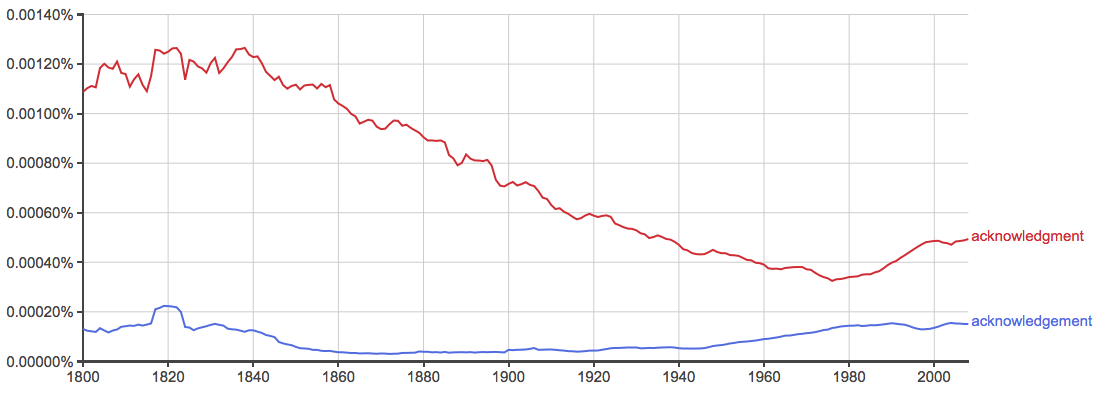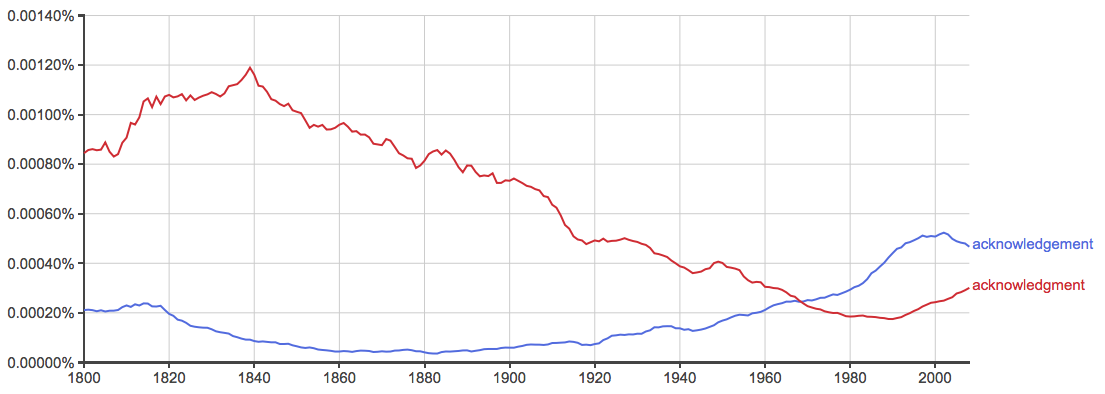Spelling differences have tripped up writers and editors since the first days of English dictionaries. For many reasons, among them a healthy literary rivalry, American writers and British writers have decided on several disparate spelling conventions.
One of these conventions deals with the silent -e at the end of many words. Ordinarily, this -e is dropped with most suffixes, especially in American English. Some words retain the -e in British English, which causes confusion, especially when choosing words like acknowledgment or acknowledgement.
Is one of these versions of the word an error, or do they simply reflect spelling differences between language communities?
What is the Difference Between Acknowledgement and Acknowledgment?
In this article, I will compare acknowledgement vs acknowledgment. I will use each of these variants in an example sentence, so you can see them in context. Plus, I will show you a memory trick that should help you choose either acknowledgment or acknowledgement, depending on your audience.
When to Use Acknowledgment
 What does acknowledgment mean? Acknowledgment is a noun. It refers to an indication of recognition or a display of gratitude.
What does acknowledgment mean? Acknowledgment is a noun. It refers to an indication of recognition or a display of gratitude.
You can see some examples here,
- In acknowledgment of your service to the company, I am proud to award you this commemorative ink pen.
- Many books contain a list of acknowledgments for people whom the author feels contributed significantly to the finished product.
- “One of the reasons this job sucks is because we never get any acknowledgment from management,” complained Evelyn.
- Juncker’s scenarios are also an implicit acknowledgment that this crisis of faith in the European Union may not be making the bloc stronger, but represent a threat to its very future. –The New York Times
Acknowledgment (with one e) is the standard form of this word in American English and has been for at least the last 200 years.

As you can see from the above chart, which graphs acknowledgment vs. acknowledgement in American English books, acknowledgment is the preferred spelling.
When to Use Acknowledgement
 What does acknowledgement mean? Acknowledgement is another version of the same word. It has the same definitions, but it is more common in locations that use British English.
What does acknowledgement mean? Acknowledgement is another version of the same word. It has the same definitions, but it is more common in locations that use British English.
If you were writing for a predominantly British readership, you might use this sentence,
- The Queen knighted Adele in acknowledgement of her contribution to the recording arts.
- It was its first move into the non-alcoholic drinks market in the UK driven, the company says, by an acknowledgement that drinking habits are changing. –The Guardian
As you can see from the below chart, acknowledgement only became the more popular form of this word in British English midway through the 20th century. Before then, acknowledgment was the standard form in these language communities, as well.

You should keep in mind that this graph isn’t scientific and cannot be considered exactingly accurate. It only looks at words used in printed English works since 1800. Still, it illustrates a clear, long-term trend.
Trick to Remember the Difference
Choosing one of these words is a straightforward decision. You should use acknowledgment with readers of American English, and acknowledgement with readers of British English.
Since acknowledgement has an extra E, which is also the letter at the beginning of England, the mnemonic for this dilemma is conveniently built into the word itself.
Summary
Is it acknowledgement or acknowledgment? Over time, American English and British English have standardized around different spelling conventions. In this case, Americans usually drop the -e at the end of a word when adding a suffix. The British are likely to retain the same -e.
- Acknowledgment is the American variant of the noun.
- Acknowledgement is the British variant.
Since England starts with an E, and acknowledgement has an extra E, you can use the same mnemonic to decide when to use many words that differ according to these spelling conventions.
Contents
